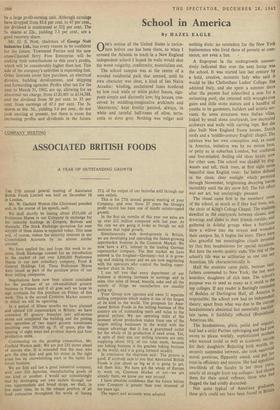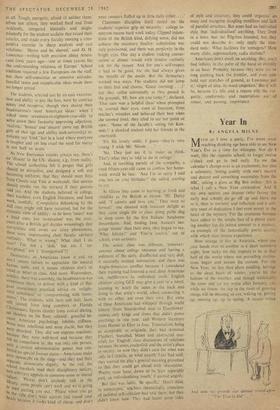School in America
By HAZEL EAGLE
ONE's notion of the United States is carica- ture before one has been there, so when I crossed the Atlantic to teach in a New England independent school I hoped its walls would shut the worst vulgarity, conformity, materialism out.
The school campus was at the centre of a wooded residential park that seemed, until its own character was clear, a kind of Ian Nairn Arcadia: winding, uncluttered lanes bordered by low rock walls or white picket fences, sign- posts simple and discreetly low; big houses, con- ceived by middling-imaginative architects and 'decorators,' kept freshly painted, always, in white and tasteful half-tones of olive, terra- cotta or dove grey. Nothing was vulgar and nothing drab; no reminders for the New York businessmen who lived there of poverty or com-
merce, not even a bus. -
A fingerpost in the undergrowth unasser- tively indicated that over the next hump was the school. It was started late last century by a bold, creative, eccentric lady who said it would be like Cheltenham Ladies' College. She admired Italy, and she spent a summer there after the parents had subscribed a sum for a swimming pool; she returned with wrought-iron gates and little stone statues and a handful of youths to be gardeners, builders and artistic ser- vants. So some structures were Italian villas, linked by small stone courtyards, low decorated archways and walls with curving tops. But she also built New England frame houses, Dutch roofs and a 'middle-century English' chapel. The mixture was her own conception and, as
usual
in America, imitation was by no means base, or petty as in suburban London, but confident and free-minded, finding old ideas handy now for other uses. The school was shaded by dog- woods and tall, thick trees, at first sight more beautiful than English trees: far better defined in the clean, clear sunlight which persisted through November, brightening decaying leaves incredibly until the dry snow fell. The full effect was not art, but uncloyingly pleasant.
The visual came first in the members' sense
of the school, as much as if they had been, say, the choir of King's College Chapel. The students dawdled in the courtyards between classes, sell! drawings and slides to their friends outside, all gathered in doleful groups when a hurricane blew a willow into the stream and wounded their campus. So, it begins the story. There were also graceful but meaningless rituals invented by that first headmistress for special occasions. But here the exotic quality ends. The rest of the school's life was as utilitarian as one can saY American life characteristically is.
Half the students came daily, because
their fathers commuted to New York; the rest were boarders, daughters of rich men. The school's purpose was to send as many as it could to the. top colleges. If any reader is fleetingly reMillrle,a of Bedales or Dartington Hall, all America Ist responsible; the school now had no indePenden. theory; apart from what was due to the curren, headmistress's abnormal but essentially inarticil, late tastes, it faithfully reflected (Republican'
American life. tar,
The headmistress, plain, pallid and angu _ had had a strict Puritan upbringing and had sworn to please worldly, sophisticated mother_ who wanted social as well as academic succe: for their daughters. Rejecting both
worlds, al securely suspended between, she took
moral positions, flippantly stated, and put ted trust in efficiency and success. She had aPP°111 two-thirds of the faculty in her three Year; nearly all straight from top colleges: had ellose had them for their quick reflexes; those who flagged she had coldly discarded. graduate!"
Not quite typical of American
these girls could not have been found in Britain THE SPECTATOR, DECEMBER 2. at all. Tough, energetic, afraid of neither them- selves nor others, they worked hard and lived recklessly, competed blatantly and single- mindedly for the student acclaim that raised their salaries, and made every faculty meeting a com- petitive exercise in sharp analysis and, real solutions: 'Shove and be shoved,' said D. H. Lawrence—writing With precision about Ameri- cans forty years ago--'one at times yearns for the understanding mildness of Europe.' School tradition required a few Europeans on the staff. but their self-conscious or sensitive attitudes, fanciful tastes and inapplicable ideas made them no longer prized.
The students, selected just by an easy examina- tion and ability to pay the fees, were by contrast sunny and receptiae, though they shared their headmistress's most American ideas: when I asked some seventeen-to-eighteen-year-olds to write down their favourite approving adjectives. realistic,' and 'sincere' came top. British girls of that age and ability (sub-university) in- evitably say 'kind,' but in a land where everyone Is tougher and Vet less cruel the need for mercy is not half so acute
As New Statesman visitors always say, there's no 'dissent' in the US: dissent, e.g., from reality. The school authorities felt it proper that girls should be attractive, and designed a soft and becoming uniform; that they should meet boys from Choate and Yale at weekends; that seniors Should smoke (on the terrace) if their parents said yes. And the students believed in college, their teachers, even English literature, and hard work, zestfully. (Compulsive debunking by the dull ones might Still have occurred, but for the dynamic view of ability: to be born 'smart' was a ,bead start. but 'motivation' was the crux: Years after a British girl decides woundingly that universities and swots are alien phenomena, these were importuning their faculty advisers restlessly: What is wrong? What shall I do next? i not a 'slob, but am I 'un- disciplined.' am I - 'disorganised'?) Democracy as Americans know it and we dslt1n t means failure to appreciate the natural nurnan
scale, and it means children don't sit
timid or bitter in class. And more. Wednesdays. inidday' there was assembly; the headmistress was sometimes there, to deliver with a kind of flip- pant insouciance practical advice on 'enlight- ened selfishness' or 'compromising with room-
ale. The students, with their soft hair, faces
_still tanned from long summers or Florida Qlristmases, figures slender from stoical dieting. sat shoeless on the floor, relaxed: graceful be- cause American psychology inhibits stiffness. "one were rebellious and none docile, but they Were detached. They did not express reactions, because they were well-bred and because. they fe
with no compulsion to; she was only one person.
ul a certain administrative power that con- ferred _0 no special hanion status—Arnericans make Pse or monarchs on the stage—and they had their separate, democratic dignity. At the end, the n_11°01 marshals read their disciplinary notices, vau:1-aabitrary appeals to common sense or shared ustti's: 'Please don't anybody talk in the -aaary; some people can't work and we're going to start putting you out.' 'Please when you go to the sit bead le don't wear scarves tied round your s because it looks kind of cheap, and don't
wear sweaters fluffed up in little balls either. ...'
Classroom discipline itself rested on the students' superior grip on necessity: college to- morrow means hard work today. Clipped injunc- tions of the British kind, defying sense, did not achieve the necessary finality; submission was only provisional, and there was perplexity in the bright eyes. One day a student making conver- sation at dinner would with modest curiosity ask for the reason. And for one's self-respect it had to be good, for she had always given the benefit of the doubt. But the democracy worked two ways. The students did not jump to their feet and chorus, 'Good morning . .!' but they called animatedly as they passed in the grounds, 'Hi, how are you today?'; declared, 'That sure was a helpful class' when prompted to, averted their eyes, even at fourteen, from teacher's mistakes and behaved their best when she seemed tired; they tried to see her point of view: 'Some of the faculty's voting for Ken- nedy!' a shocked student told her friends in the courtyard.
'It's his lovely smile, I guess—they're very young. I wish Mr. Nixon .
'No. They just Say it to make us think. That's what they're told to do in college.'
And, in touching parody of the sympathy, a tired fifteen-year-old came to confess her home- work would be late: 'And I'M so sorry I told you this on your birthday!' she added, starting to Cry.
At fifteen they came to learning as fresh and childlike as the British at eleven. 'Mr. Darcy said, "I admire and love you." They were so formal!' one shouted with innocent delight as they came single file to class along paths dug in deep snow • by the first Italians' handsome descendants. And, finding Jane Austen's lan- guage 'neater' than their own, they began to say, 'What felicity!' and 'You're uncivil,' out of school. even seriously.
The senior class was different, however: anxious about college entrance and having a sediment of the surly, disaffected and very dull. it naturally resisted innovation, and there was Anglo-American conflict because I considered their training had fostered a real. deep American sin, indifference to individual truth. English children sitting GCE may give a year to a novel, learning by heart the notes •at the back and living in that artist's world, albeit connecting it with no other, not even their own. But some of these Americans had whipped through world history 'from Neanderthal man to Eisenhower'
(minus only kings and times that didn't prove anything) in one year, and Western literature from Homer to Eliot in four. Translations being as acceptable as originals, they had skimmed Flaubert..Stendhal, Mann and abstracted mat- erials for 'English' class discussions of relations
between the sexes, realpolitik and the artist's place in society, so now they didn't care for what was
only in Cordelia, or what exactly Lear had said; they wanted the play's general meaning presented so that they could get ahead with 'discussion.'
'Poetry must have, down to its least separable
part, an individualising touch,' I quoted angrily. But that was futile. 'Be specific,' Don't think in stereotypes,' teachers theoretically conscious
of national self-criticism had told them; but they didn't know how. They had learnt some rules of style and structure; they could 'organise' an essay and recognise dangling modifiers and lack of parallel structnre. But none had an individual style that 'individualised' anything. They lived in a town that the Pilgrims founded, but they could not describe it: only apply the stan- dard tests: What facilities for teenagers? How many clubs, supermarkets, radio stations?
Americans don't dwell on anything; the', don't find intinita in the palm of the hand or eternity in an hotir. Probably because they were for so long pushing back the frontier, and even now hold vast stretches of ground, as Lawrence put it,' virgin of idea, its word unspoken.' But it will be, because it's life. and a reason why the s garity, conformity and materialism are of minor, and passing. importance.































 Previous page
Previous page